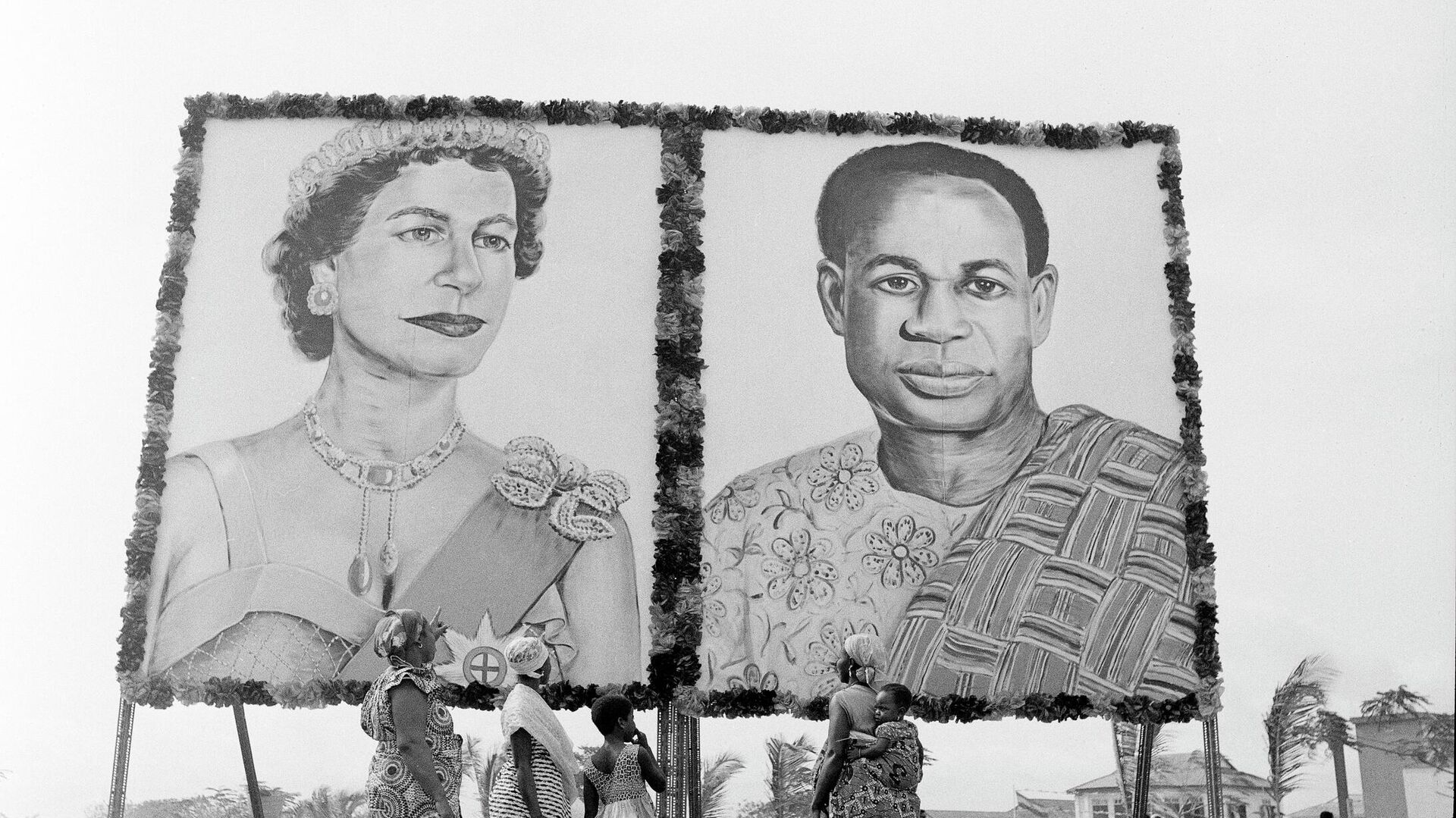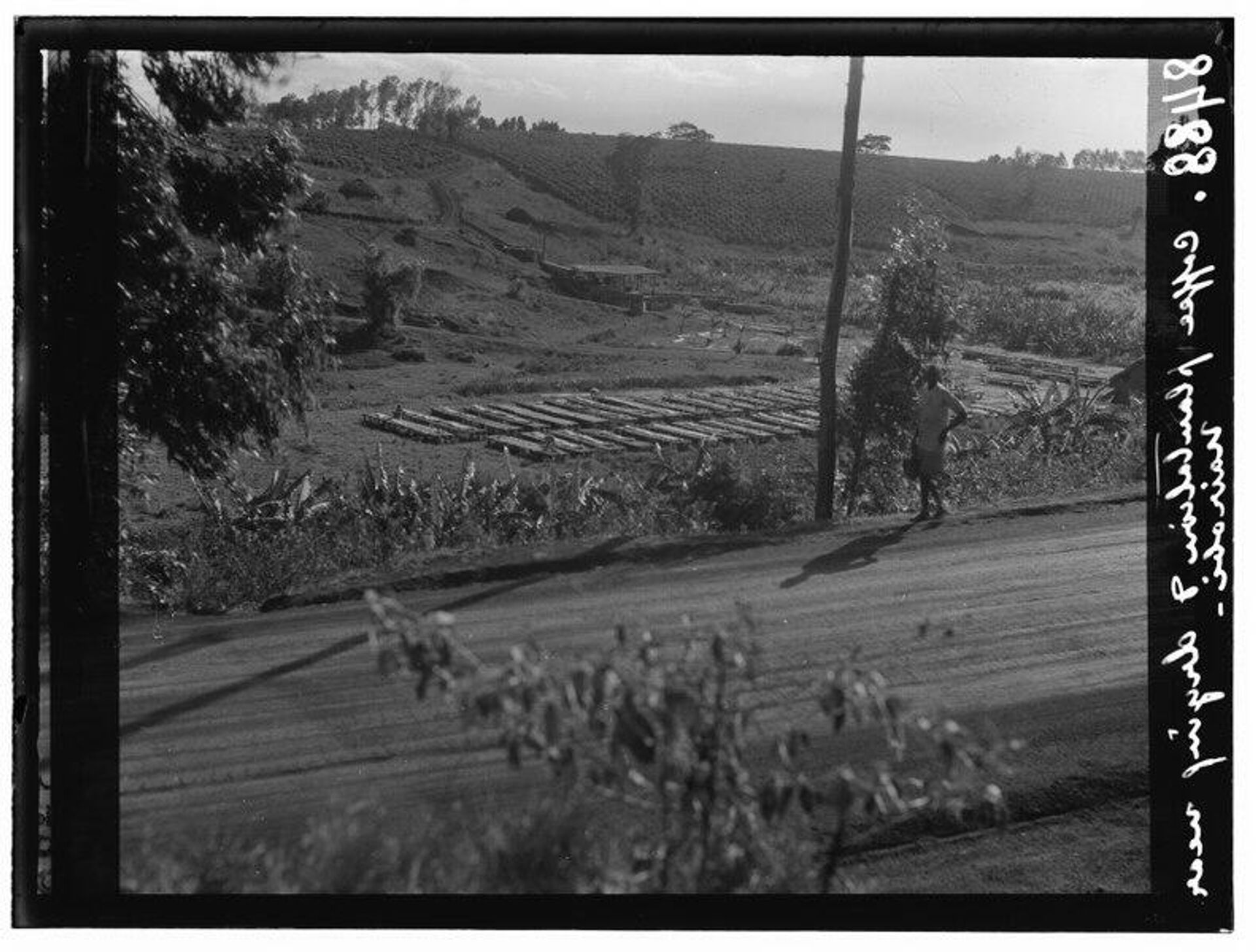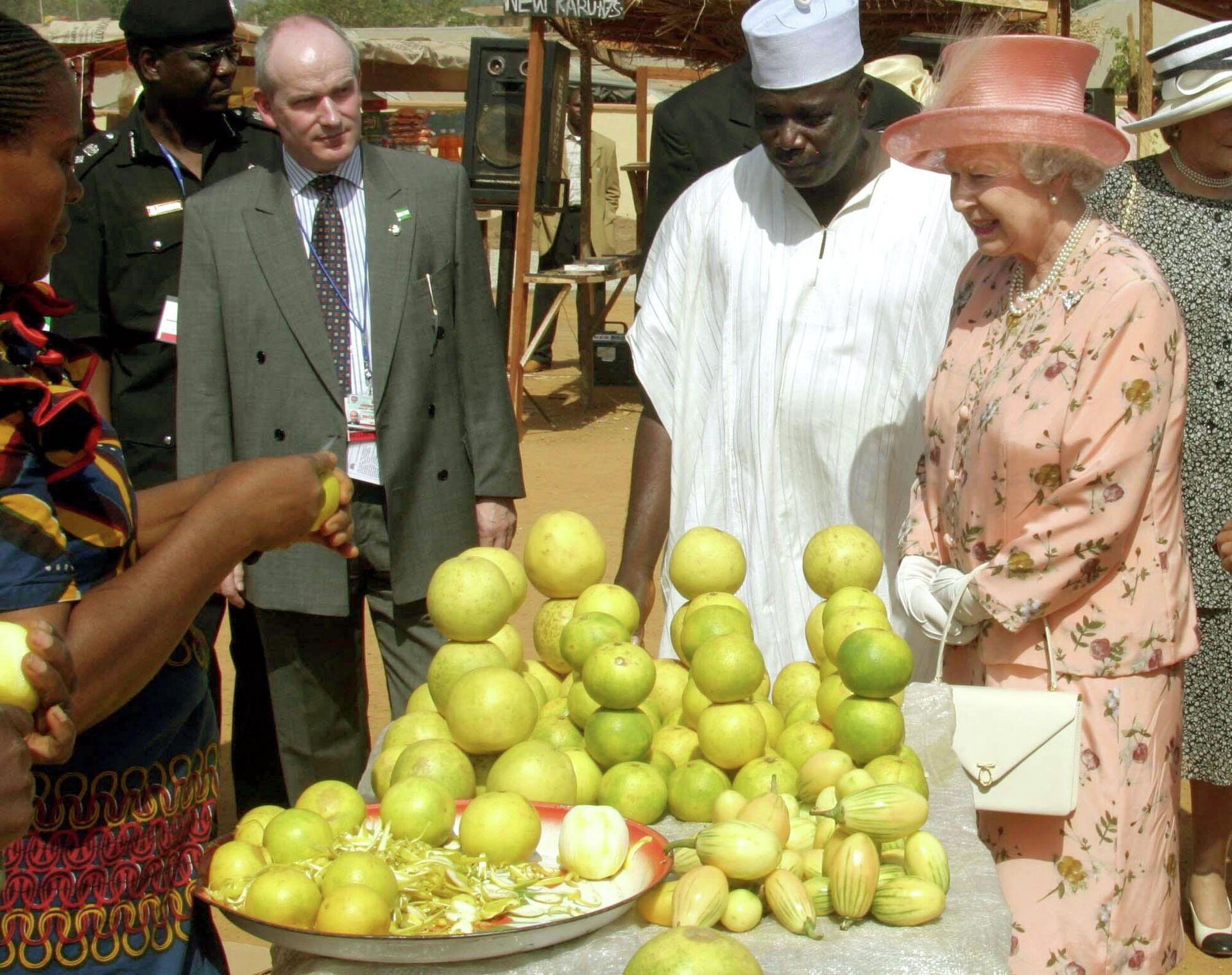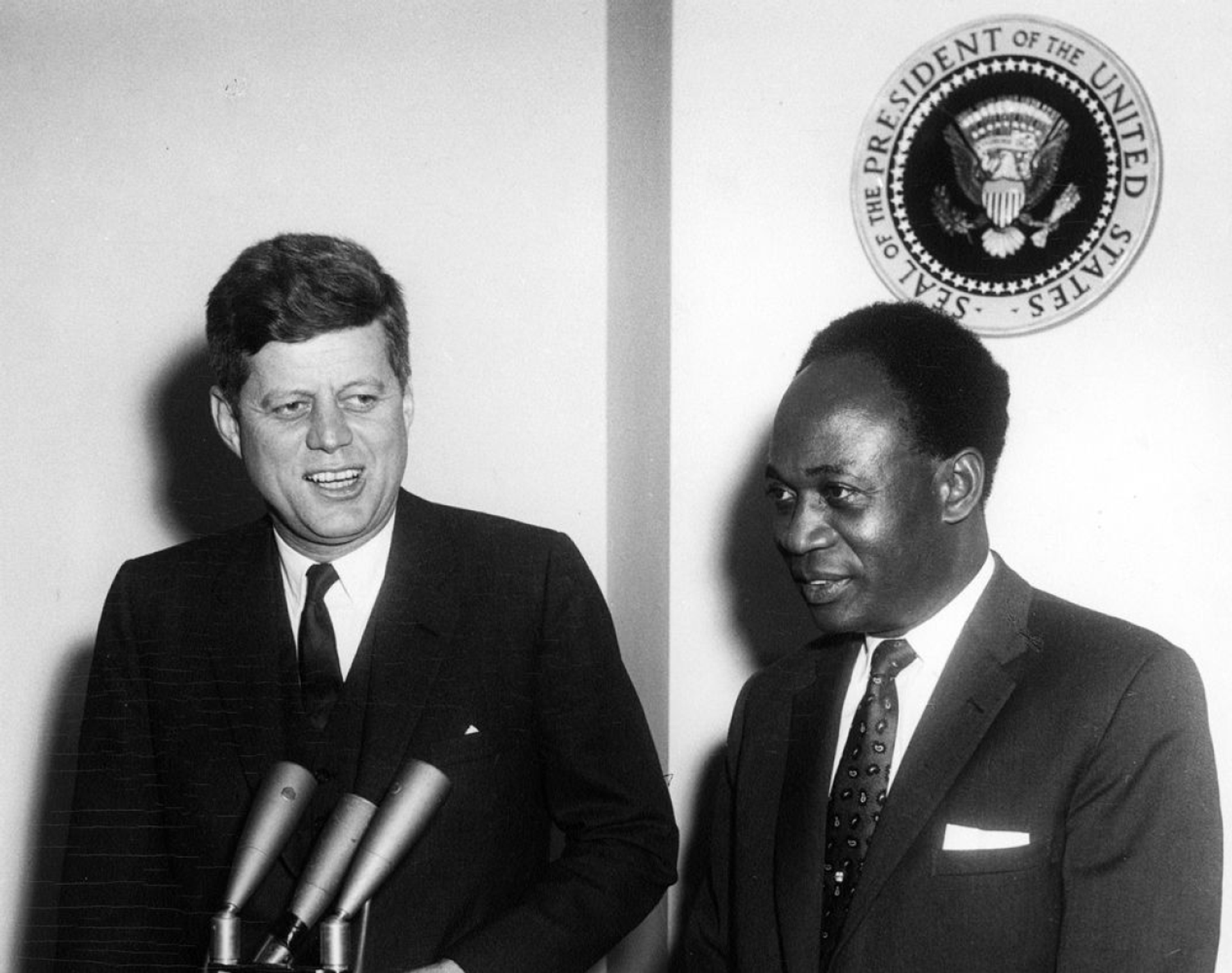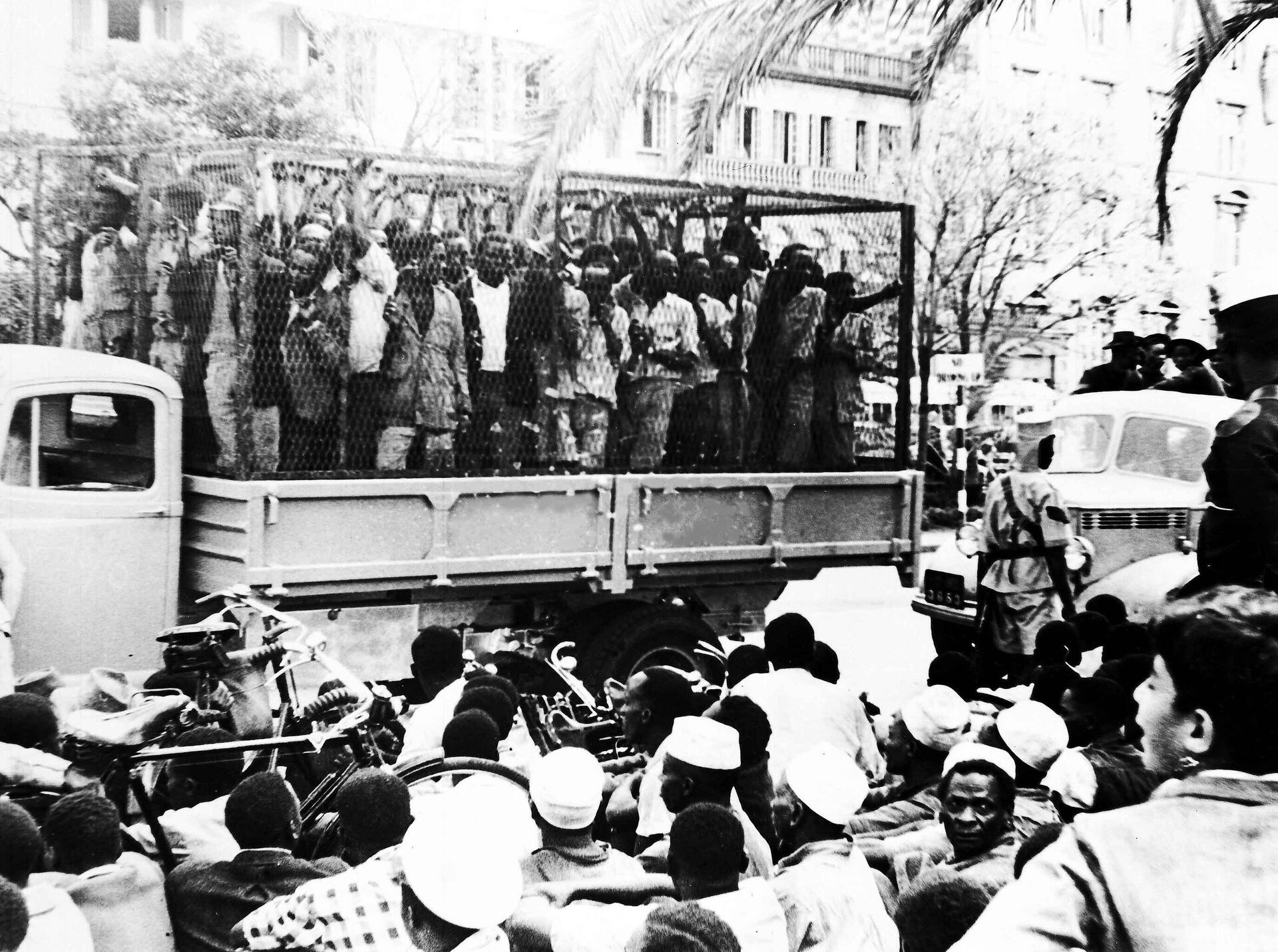https://sputnikglobe.com/20220908/queen-elizabeth-ii-presided-over-the-collapse-of-britains-brutal-colonization-of-africa-1100561359.html
Queen Elizabeth II Presided Over the Collapse of Britain’s Brutal Colonization of Africa
Queen Elizabeth II Presided Over the Collapse of Britain’s Brutal Colonization of Africa
Sputnik International
The late British monarch’s reign began in Africa in 1952, heralding the beginning of the end of an empire on which the Sun was infamously boasted to “never... 08.09.2022, Sputnik International
2022-09-08T20:10+0000
2022-09-08T20:10+0000
2022-11-24T11:01+0000
africa
queen elizabeth ii
british empire
kenya
rhodesia
egypt
south africa
ghana
https://cdn1.img.sputnikglobe.com/img/07e6/09/08/1100563356_0:409:2187:1639_1920x0_80_0_0_0e266662cea4febd0b9eb4c6fbad7b3c.jpg
As fate would have it, Elizabeth, then 25 years old, was in British Kenya when King George VI died on February 6, 1952. She received the news from her husband Phillip, the Duke of Edinburgh, at the Sagana Lodge royal residence on the southern slope of Mount Kenya. George’s death had been expected for some time, and Elizabeth’s private secretary carried a draft accession declaration with them during their world tour that began in 1951.Lands of Great WealthBy the time Elizabeth acceded to the throne in February 1952, the empire had already begun to implode. The “Jewel in the Crown,” the British Raj, had already declared independence and split into India and Pakistan, and a Zionist terrorist campaign had helped drive the British out of Palestine and Jordan, leading to the birth of Israel. In British Malaya and soon in Kenya, the British Army struggled to tame furious liberation wars, euphemistically described as “emergencies” by the colonial rulers.Devolution had already become a popular demand across the British Empire, especially in colonies with large populations of British settlers. The 1931 Statute of Westminster had made “dominions,” de facto independent countries of which the British monarch was still head of state, out of Canada, Newfoundland, New Zealand, Australia, the Irish Free State, and South Africa, although the lattermost had already been combined into a single dominion state out of several smaller colonies in 1909, part of the continuing fallout of the Boer War.From these lands, Britain variously extracted gems like diamonds; precious metals such as gold, silver, and platinum; cash crops including cotton, rubber, tobacco, coffee, tea, cocoa, maize, groundnuts, edible oils such as palm oil; wood; and ivory. These were almost exclusively farmed by native Africans, whose traditional systems of production and distribution were violently incorporated into the global capitalist system, tearing ancient societies apart in what historian Mike Davis called “Late Victorian Holocausts.”Human labor also served as a valuable resource, with Africans used for de facto slave labor to build dams, railways, roads, and other structures across the continent as well as in other parts of the British Empire, even though slavery had been abolished in the empire in 1833. Thousands were also drafted to serve as soldiers, both to maintain imperial order in the colonies and to fight in British wars abroad, most infamously the First World War.'Post-Colonial Melancholia'“I think the British legacy [in Africa] is mixed: they were occupiers, not there upon invitation. But compared to other colonial powers, they kept more distance to the African society, I think there was more space for locals to have a say in the British colonies compared to the French, Italian, Belgian colonies. Britain ruled using the local elites, including tribal elites,” Dr. Stig Jarle Hansen, associate professor and leader of the international relations program at the Norwegian University of Life Science and Africa expert, told Sputnik on Thursday.“Yet the Mau Mau rebellion showed that the Brits could use violence if pressured. The fact that many of the colonies developed security forces focusing on controlling the local population, rather than to protect them, also left a legacy today, creating a heritage that troubles present-day police forces,” Hansen added.Dr Rasigan Maharajh, Chief Director, Institute for Economic Research and Innovation at Tshwane University of Technology, South Africa, told Sputnik that “all monarchies in our contemporary conjuncture are anachronistic institutions” that “utilize public resources for the purposes of defending their own and their ilk's various private expropriations, appropriations, exploitations, and the accumulation trajectories of those owning wealth and thereby controlling society and the political apparatus that support such inequities.”“The British occupation forces encountered significant and persistent resistance from the peoples of Africa, as exemplified by their defeat at Isandlwana by the local Zulu people,” Maharajh recalled. “Notwithstanding heroic struggles against imperialism and colonialism, the military might of the Empire was buttressed through their mobilization of scientific, technological, and industrial capacities and capabilities for the purposes of securing access to resources and maintaining unequal trade.”Sabelo J. Ndlovu-Gatsheni, historian and decolonial/postcolonial theorist, Professor and Chair of Epistemologies of the Global South with Emphasis on Africa at the University of Bayreuth in Germany, told Sputnik that "the legacy of British colonialism, just like that of enslavement of Africans, is still felt today and is identified with the underdevelopment of Africa, and the British monarchy is seen as having presided of over the inimical colonialism that was responsible for dismemberment of the people, exploitation of the people, domination of the people and indeed dehumanization."Empire Breaks AwaySouth Africa’s path to dominion status was used as the template for granting independence to numerous other African colonies. The first was Ghana, which achieved “self-government” in 1957 following a prolonged civil resistance movement led by Kwame Nkrumah, a Marxist thinker and Pan-Africanist who gave theoretical shape to the understanding of neo-colonialism in his 1965 book on the subject.Ghana quickly left the empire, shedding the governor-general and declaring a republic in 1960, the same year that several surrounding French colonies also broke away from France, which had been greatly weakened by disastrous losses against national independence movements in Indochina and Algeria.By the late 1970s, every African possession of the British crown had become independent, most of them through a peaceful transfer of power to local rulers, who often retained economic and political ties with London. However, one brutal colonial war left an unpurgeable stain upon that legacy: the Mau Mau Uprising, which the British called the Kenyan Emergency.‘Britain’s Gulag’The anti-colonial uprising in Kenya began in the 1940s and grew to encompass resistance movements by the Kikuyu, Meru, Embu, Kamba, and Maasai peoples, all of whom were being displaced from their native lands by waves of European settlers or who were forced into becoming cheap labor on the Europeans’ new farms. However, the assassination of several white settlers and African collaborators led Governor Evelyn Baring to declare a state of emergency in October 1952, months after Elizabeth took the throne.It took seven years for the British to bring Kenya under control, deploying the tactics pioneered in Malaya and earlier in the Boer War, the most infamous of which were concentration camps. The British herded most of the civilian population into the camps to keep them from supporting the guerrilla fighters, and they established checkpoint controls and ran mass sweeps through districts they couldn’t use camps to control, such as in Nairobi. Torture of captured KFLA or suspected KFLA members was widespread, and forced labor in the camps was common.The British authorities in Kenya attempted to cover up these deeds, with the colony's attorney general, Eric Griffith-Jones, telling Governor Baring in a 1957 letter after altering documents to hide the deaths of several Kikuyu at the hands of British guards: "If we are going to sin, we must sin quietly."For years, the British failed to understand the independence goals of the KLFA, believing variously that they were controlled by communist forces, Indian Prime Minister Jawaharlal Nehru, or some kind of “blood oath” that drove them to commit violence against Europeans. It was beyond their conception that the Kenyans could desire to rule their own country.Estimates of deaths during the war vary wildly; officially, the British claim to have killed 11,000 KFLA fighters and executed another 1,090, including KFLA leader Dedan Kimathi in 1957. However, historians estimate that at least 20,000 KFLA fighters were killed in the war and that as many as 50,000 civilians died, most of them as a result of the poor conditions in the concentration camps. Upper estimates challenged by many historians claim 300,000 deaths in Kenya.‘Not in a Thousand Years’The other anomaly in decolonization from Britain is Rhodesia, the rogue territory where white minority rule was furiously defended by an unrecognized state for 15 years.In 1964, the Federation of [Northern] Rhodesia and Nyasaland split to become Zambia and Malawi, so Southern Rhodesia dropped the qualifier and became Rhodesia. In defiance of the British government’s policy of “no independence before majority rule” (NIBMR) for its colonies, the white minority government of Ian Smith issued a unilateral declaration of independence (UDI) from the British Empire - the first such declaration since the American Declaration of Independence in 1776.Smith’s government was a de facto apartheid state similar to that in South Africa, although in Rhodesia it was maintained by qualifications for political office that excluded the vast majority of Black Africans. Whites constituted just 5% of Rhodesia’s population.However, parallel to the UDI and his efforts to maintain white rule, African resistance movements launched a guerrilla war against Smith’s government, and four years after that statement, he was forced to yield to majority rule, and the first majority-Black government was formed. The new state, now internationally recognized, became independent under the name Zimbabwe, after the ancient historic site located there.In the April 1980 elections, the Zimbabwe African National Union (ZANU), which had led the insurgency, won a majority, and leader Robert Mugabe became prime minister.“In term, Britain joined the Western international community to criticize Zimbabwe for violation of property rights and other human rights and imposed what became known as smart sanctions on Zimbabwe. This is one example of how states still feel the pain of colonialism.”
africa
kenya
rhodesia
egypt
south africa
ghana
Sputnik International
feedback@sputniknews.com
+74956456601
MIA „Rossiya Segodnya“
2022
News
en_EN
Sputnik International
feedback@sputniknews.com
+74956456601
MIA „Rossiya Segodnya“
Sputnik International
feedback@sputniknews.com
+74956456601
MIA „Rossiya Segodnya“
queen elizabeth ii, british empire, kenya, rhodesia, egypt, south africa, ghana
queen elizabeth ii, british empire, kenya, rhodesia, egypt, south africa, ghana
As fate would have it, Elizabeth, then 25 years old, was in British Kenya when King George VI died on February 6, 1952. She received the news from her husband Phillip, the Duke of Edinburgh, at the Sagana Lodge royal residence on the southern slope of Mount Kenya. George’s death had been expected for some time, and Elizabeth’s private secretary carried a draft accession declaration with them during their world tour that began in 1951.
By the time Elizabeth acceded to the throne in February 1952, the empire had already begun to implode. The “Jewel in the Crown,” the British Raj, had already declared independence and split into India and Pakistan, and a Zionist terrorist campaign had helped drive the British out of Palestine and Jordan, leading to the birth of Israel. In British Malaya and soon in Kenya, the British Army struggled to tame furious liberation wars, euphemistically described as “emergencies” by the colonial rulers.
Devolution had already become a popular demand across the British Empire, especially in colonies with large populations of British settlers. The 1931 Statute of Westminster had made “dominions,” de facto independent countries of which the British monarch was still head of state, out of Canada, Newfoundland, New Zealand, Australia, the Irish Free State, and South Africa, although the lattermost had already been combined into a single dominion state out of several smaller colonies in 1909, part of the continuing fallout of the Boer War.
When Elizabeth took the throne, the African lands ruled by her empire included four territories in West Africa (The Gambia, Sierra Leone, Ghana and Nigeria); four in East Africa (Kenya, Uganda, Zanzibar and Tanganyika); the two Rhodesias and Nyasaland (today Zambia, Zimbabwe, and Malawi); the South African High Commission Territories of Bechuanaland (Botswana), Basutoland (Lesotho) and Swaziland (Eswatini); as well as the Dominion of South Africa. Britain also ruled the island of Mauritius, far off the east coast in the Indian Ocean.
From these lands, Britain
variously extracted gems like diamonds; precious metals such as gold, silver, and platinum; cash crops including cotton, rubber, tobacco, coffee, tea, cocoa, maize, groundnuts, edible oils such as palm oil; wood; and ivory. These were almost exclusively farmed by native Africans, whose traditional systems of production and distribution were violently incorporated into the global capitalist system, tearing ancient societies apart in what historian Mike Davis called
“Late Victorian Holocausts.”Human labor also served as a valuable resource, with Africans used for de facto slave labor to build dams, railways, roads, and other structures across the continent as well as in other parts of the British Empire, even though slavery had been abolished in the empire in 1833. Thousands were also drafted to serve as soldiers, both to maintain imperial order in the colonies and to fight in British wars abroad, most infamously the First World War.
'Post-Colonial Melancholia'
“I think the British legacy [in Africa] is mixed: they were occupiers, not there upon invitation. But compared to other colonial powers, they kept more distance to the African society, I think there was more space for locals to have a say in the British colonies compared to the French, Italian, Belgian colonies. Britain ruled using the local elites, including tribal elites,” Dr. Stig Jarle Hansen, associate professor and leader of the international relations program at the Norwegian University of Life Science and Africa expert, told Sputnik on Thursday.
“Yet the Mau Mau rebellion showed that the Brits could use violence if pressured. The fact that many of the colonies developed security forces focusing on controlling the local population, rather than to protect them, also left a legacy today, creating a heritage that troubles present-day police forces,” Hansen added.
“Queen Elizabeth was seen as aloof of this by many,” he added. “I think for most, Elizabeth is a remote memory, and means little, even in the Commonwealth countries. She is seen as a decent human being, but also very remote.”
Dr Rasigan Maharajh, Chief Director, Institute for Economic Research and Innovation at Tshwane University of Technology, South Africa, told Sputnik that “all monarchies in our contemporary conjuncture are anachronistic institutions” that “utilize public resources for the purposes of defending their own and their ilk's various private expropriations, appropriations, exploitations, and the accumulation trajectories of those owning wealth and thereby controlling society and the political apparatus that support such inequities.”
“The British Monarchy is imbued with such characteristics and worse still: expanded vicious and violent incorporations of the diverse and varied peoples of the world through epistemicide, unfree labor slavery, natural resource theft (a 530 carat diamond called the 'The Great Star of Africa' was mined in Tshwane in 1905, yet now rests amongst the Crown Jewels in London), and rampant corruption through colonial, post-, and neo-colonial unequal relations of exchange. The weight of such tradition weighs heavily on the present and especially reduces progressive potentials being realized for a better life for all.”
“The British occupation forces encountered significant and persistent resistance from the peoples of Africa, as exemplified by their defeat at Isandlwana by the local Zulu people,” Maharajh recalled. “Notwithstanding heroic struggles against imperialism and colonialism, the military might of the Empire was buttressed through their mobilization of scientific, technological, and industrial capacities and capabilities for the purposes of securing access to resources and maintaining unequal trade.”
“We must redress any postcolonial melancholia, reassess our neocolonial inequities, and consign all monarchies into the dustbin of history. We must break the farce-tragedy sequence from being reproduced and perpetrated through the 'whitewashing' (sic) of history. Whilst acknowledging with condolences the death of another human being, our attitude from the Global South towards the demise of the symbolic head of the criminal network of colonialism must firmly reject empire and all its manifestations,” Maharajh said.
Sabelo J. Ndlovu-Gatsheni, historian and decolonial/postcolonial theorist, Professor and Chair of Epistemologies of the Global South with Emphasis on Africa at the University of Bayreuth in Germany, told Sputnik that "the legacy of British colonialism, just like that of enslavement of Africans, is still felt today and is identified with the underdevelopment of Africa, and the British monarchy is seen as having presided of over the inimical colonialism that was responsible for dismemberment of the people, exploitation of the people, domination of the people and indeed dehumanization."
“In the context of the current resurgent and insurgent decolonization of the 21st century, there is a second sight on colonialism as one of those systems of domination that left no aspect of African life unaffected, and therefore the British monarchy is not viewed positively even 60 years since political decolonization,” he said. “In countries like South Africa, where racism is still a live problem and where neo-apartheid is visible in names of streets and iconography, colonialists are still held responsible for entrenchment of material inequalities and looting of resources.”
South Africa’s path to dominion status was used as the template for granting independence to numerous other African colonies. The first was Ghana, which achieved “self-government” in 1957 following a prolonged civil resistance movement
led by Kwame Nkrumah, a Marxist thinker and Pan-Africanist who gave theoretical shape to the understanding of neo-colonialism in his 1965 book on the subject.
However, five years earlier and just months after Elizabeth took the throne, the July 23 Revolution in Egypt led by Gamel Abdel Nasser overthrew King Farouk, the ruler of Egypt and Sudan and a puppet of the British, spelling the imminent end of the monarchy and the end of British occupation of the two countries. Nasser’s nationalist, Pan-Arab program sought to rebuild Egypt after decades of British colonial rule, including reclaiming the Suez Canal, dug for the empire by Egyptian forced labor.
Ghana quickly left the empire, shedding the governor-general and declaring a republic in 1960, the same year that several surrounding French colonies also broke away from France, which had been greatly weakened by disastrous losses
against national independence movements in Indochina and Algeria.
By the late 1970s, every African possession of the British crown had become independent, most of them through a peaceful transfer of power to local rulers, who often retained economic and political ties with London. However, one brutal colonial war left an unpurgeable stain upon that legacy: the Mau Mau Uprising, which the British called the Kenyan Emergency.
The anti-colonial uprising in Kenya began in the 1940s and grew to encompass resistance movements by the Kikuyu, Meru, Embu, Kamba, and Maasai peoples, all of whom were being displaced from their native lands by waves of European settlers or who were forced into becoming cheap labor on the Europeans’ new farms. However, the assassination of several white settlers and African collaborators led Governor Evelyn Baring to
declare a state of emergency in October 1952, months after Elizabeth took the throne.
It’s unclear where the name Mau Mau comes from, as many who fought in it referred to themselves as the Kenya Land and Freedom Army (KLFA). It’s been variously suggested that it was an anagram of the Swahili phrase “uma, uma!” (“get out, get out!”), or that Mau Mau was a generic British term for Kikuyu, the majority ethnic group in central Kenya. A Swahili backronym later rendered it as "Mzungu Aende Ulaya, Mwafrika Apate Uhuru," meaning "Let the foreigner go back abroad, let the African regain independence."
It took seven years for the British to bring Kenya under control, deploying the tactics pioneered in Malaya and earlier in the Boer War, the most infamous of which were concentration camps. The British herded most of the civilian population into the camps to keep them from supporting the guerrilla fighters, and they established checkpoint controls and ran mass sweeps through districts they couldn’t use camps to control, such as in Nairobi.
Torture of captured KFLA or suspected KFLA members was widespread, and forced labor in the camps was common.
According to some estimates, as many as 320,000 Kenyans were put into detention camps and 1.5 million people, including almost the entire Kikuyu population, were either put into camps or so-called “protected villages.” Harvard historian Caroline Elkins has referred to the camp system
as “Britain’s Gulag.”The British authorities in Kenya attempted to cover up these deeds, with the colony's attorney general, Eric Griffith-Jones, telling Governor
Baring in a 1957 letter after altering documents to hide the deaths of several Kikuyu at the hands of British guards: "If we are going to sin, we must sin quietly."
For years, the British failed to understand the independence goals of the KLFA, believing variously that they were controlled by communist forces, Indian Prime Minister Jawaharlal Nehru, or some kind of “blood oath” that drove them to commit violence against Europeans. It was beyond their conception that the Kenyans could desire to rule their own country.
Although the uprising was subdued militarily by 1960, it was clear the British could not retain control over the country, as even liberal civilian civil society groups had united in their demand for independence, which was finally achieved in 1963.
Estimates of deaths during the war vary wildly;
officially, the British claim to have killed 11,000 KFLA fighters and executed another 1,090, including KFLA leader Dedan Kimathi in 1957. However, historians estimate that
at least 20,000 KFLA fighters were killed in the war and that as many as 50,000 civilians died, most of them as a result of the poor conditions in the concentration camps. Upper estimates challenged by many historians claim 300,000 deaths in Kenya.
‘Not in a Thousand Years’
The other anomaly in decolonization from Britain is Rhodesia, the rogue territory where white minority rule was furiously defended by an unrecognized state for 15 years.
In 1964, the Federation of [Northern] Rhodesia and Nyasaland split to become Zambia and Malawi, so Southern Rhodesia dropped the qualifier and became Rhodesia. In defiance of the British government’s policy of “no independence before majority rule” (NIBMR) for its colonies, the white minority government of Ian Smith issued a
unilateral declaration of independence (UDI) from the British Empire - the first such declaration since the American Declaration of Independence in 1776.
London refused to recognize Smith’s new state, denouncing it as an act of rebellion against the Crown. The United Nations followed London’s lead, branding Smith’s government an "illegal racist minority regime" and imposing sanctions against it.
Smith’s government was a de facto apartheid state similar to that in South Africa, although in Rhodesia it was maintained by qualifications for political office that excluded the vast majority of Black Africans. Whites constituted just 5% of Rhodesia’s population.
“Let me say it again. I don't believe in black majority rule ever in Rhodesia - not in a thousand years,”
Smith said in a 1976 radio broadcast.
However, parallel to the UDI and his efforts to maintain white rule, African resistance movements launched a guerrilla war against Smith’s government, and four years after that statement, he was forced to yield to majority rule, and the first majority-Black government was formed. The new state, now internationally recognized, became independent under the name Zimbabwe, after the ancient historic site located there.
In the
April 1980 elections, the Zimbabwe African National Union (ZANU), which had led the insurgency, won a majority, and leader Robert Mugabe became prime minister.
“The country of Zimbabwe, a former British colony, where land was expropriated by the colonialists and where under Robert Mugabe the land was reclaimed forcefully from white farmers, bilateral relations between Zimbabwe and Britain have remained restrained as Britain is accused of having abandoned its colonial obligations to pay for reclamation of land,” Ndlovu-Gatsheni told Sputnik.
“In term, Britain joined the Western international community to criticize Zimbabwe for violation of property rights and other human rights and imposed what became known as smart sanctions on Zimbabwe. This is one example of how states still feel the pain of colonialism.”
